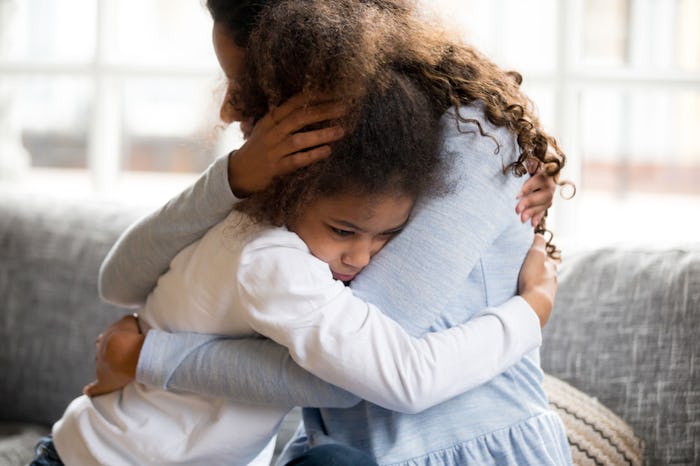Life

In Case You Need A Reminder, It's More Than OK To Let Your Kid Feel Negative Emotions
More times than I can count, I've seen bumper stickers with cute sayings like "Good Vibes Only" and "Keep Calm and fill-in-the-blank On" plastered across minivans and stuck to the side of refrigerators everywhere. While I can appreciate the positive message these sayings imply, our society has recently been inundated with positivity to the point where it often seems like choosing any other emotion is wrong. Living in a society where happiness is the only emotional choice can be hard for adults, but how does toxic positivity affect your kids?
The term toxic positivity is seen in a multitude of articles by mental health professionals warning about the potential harmful effects that a society oversaturated with positivity can have as people neglect acknowledging negative emotions. Newsweek reported that people with mental health conditions like depression and anxiety can feel shamed by this constant message of positive thinking because they are often consumed with negative emotions they cannot control. Unfortunately, this shame doesn't end with adults and can also spread into the lives of your kids.
Maureen Healy, author of The Emotionally Healthy Child and parenting coach at Growing Happy Kids, explains what toxic positivity might look like for parents. "From my perspective, I would term it as 'blind positivity' where a parent is constantly praising a child for everything, being overly positive and inauthentic about his or her feelings," she says to Romper.
Healy gives the perfect example of how this type of positivity can be dangerous for children. "So if a parent had a hard day, she smiled and said, 'Everything is great' to her daughter when it wasn't true — the truth is she got a flat tire, and lost her keys. The problem with not sharing in age-appropriate ways your real feelings is that it sends children the wrong message that they need to pretend everything is OK, and they can't handle the truth of life's challenges or problematic days," she says.
The act of making sure that your kids are growing up with a healthy balance of positive encouragement and the space to experience the negativity that life experiences naturally bring can be exhausting. Dr. Sarah Hornack, a pediatric psychologist at Children's National Health System, explains that regardless of the difficulty level, this balance does matter when parenting children. "Encouraging children to be positive in the face of difficulties can send the inappropriate message that feeling down or anxious is abnormal when, in fact, these are within the range of typical human emotion," she tells Romper. "There is research to suggest that individuals who overemphasize the importance of happiness end up associating their negative feelings with failure, and spend more time focusing on these negative emotional experiences."
Dr. Hornack also describes what it might look like when toxic positivity interferes with the parent-child relationship. "Responding to children’s negative emotions or difficult situations with glib phrases like, 'Look on the bright side!' can feel dismissive or lacking empathy. It can discourage children from bringing concerns to their parents in the first place, making future interactions less open," she says. From personal experience, I can say that is the last thing I need as a parent.
In addition to being dismissive of emotions and harming open lines of communication, Dr. Kathryn Smerling, a family therapist practicing in New York, explains how toxic positivity could be setting children up for disappointment later on in life. "The impact is that it's a Pollyanna experience. It's a setup for a rude awakening for a child when they do experience setbacks and no one is there to tell them to be good all of the time," she tells Romper. "If someone tells you that you're supposed to feel good all of the time but you really don't, you just wind up feeling worse. You're creating a false sense of self." Essentially, it can't always be sunshine and rainbows all day, every day.
Experts agree that there is a difference in communicating with a child in a positive way and being overly positive all of the time, especially in the face of failure or other difficulties that will happen throughout a child's life. Dr. Smerling explains what it might look like for parents to model healthy failure for their children. "Failure is a teaching opportunity. We often learn more from failure than success, and there is nothing wrong with failing. Understanding what went wrong is more valuable than a barrage of praise. Also, as the parent, it's important to show yourself as less than perfect. We aren't perfect parents, we're good enough parents," she says.
So, how can you make sure that your parenting doesn't fall into the toxic positivity camp? "Parents who are the most successful are honest, authentic, and compassionate with their children. They don't simply say, 'Today is a great day' when their child is sad, but help a child identify his emotions and then do something to feel better," Healy explains. "Being blindly positive toward a child doesn't set him or her up for life success. Eventually, your son or daughter is going to be in a challenging situation and needs to overcome that situation. Developing resilience comes from feeling all of your feelings, and learning to access your inner strength when challenges come up."
Resilience seems to be a common theme among the professionals I spoke to. According to them, resilience is one of the top benefits of expressing a range of emotions in a healthy way versus being overly positive all of the time. Dr. Smerling suggests parents keep the following in mind when struggling to avoid toxic positivity: "Resilience is the most important thing that you can teach your children. That it's OK to have a failure, but to learn from it and bounce back. It's OK to be less than perfect and there's time to learn — and when you fall you get yourself back up again."